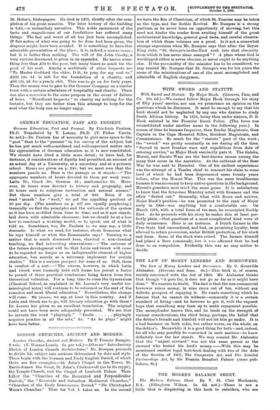GERMAN EDUCATION, PAST AND PRESENT.
German Education, Past and Present. By Friedrich Paulsen, Ph.D. Translated by T. Lorenz, Ph.D. (T. Fisher Unwin. 5s. net.)—Dr. Paulsen has of necessity to give more space to the " past " than to the " present " in his survey of the subject, but he has put much well-considered and well-expressed matter into his appreciation of German education as it is now constituted. We should have liked a little more detail ; to have had, for instance, if considerations of dignity had permitted, an account of an actual day at a University, at a secondary and at a primary school. Hours are given on p. 200; but we must own that the numbers puzzle us. Here is the passage as it stands :—" The aggregate numbers of hours devoted to them per week were : Latin 76; Greek 50; German 44 ; mathematics 60. More- over, 30 hours were devoted to history and geography, and 20 hours each to religious instruction and natural science." But these numbers give a total of 300. Even if we read "month" for "week," we get the appalling quotient of 10 per day. (The numbers on p. 227 are equally perplexing.) Generally we find the principles and the rationale of the system as it has been modified from time to time, and as it now stands, laid down with admirable clearness ; but we should be at a loss how to construct a working model, so to speak, out of what is told us. Sometimes, too, Dr. Paulsen is, we may say, a little dramatic. Is what we read, for instance, about Rousseau what he says himself or what the Rousseauite says ? Turning to a matter that is much discussed here, classical v. non-classical teaching, we find interesting observations The outcome of the future development will be that Latin and Greek will come to be regarded no longer as an indispensable element of higher education, but merely as a necessary implement for certain studies." This is a serious prospect for some of us. Still, there is comfort of a sort :—" The esteem, however, in which Latin and Greek were formerly held still forms too potent a factor to permit of these practical conclusions being drawn from this theoretical valuation. For a long time to come the Gymnasium [Classical School, as explained in Dr. Lorenz's very useful ter- minological notes] will continue to bo esteemed as the seat of the soundest and most liberal education." Nevertheless, the change will come. /44 yivotro, we say, at least in this country. And if Latin and Greek are to go, will literary education go with them ? Dr. Lorenz has given us an excellent translation. The original could not have been more adequately presented. We see that
he invents the word " playingly." "Emile playingly acquires practice in all the arts," &c. "As he plays" might have been better.
























































 Previous page
Previous page